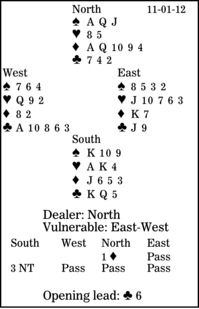Bridge column, November 1: See the danger is half the battle

Once a card has been tabled, usually it cannot be retracted.
The winning line in this deal would escape many players. What should South do in three no-trump after West leads his fourth-highest club and East puts up the jack?
The bidding is old-fashioned, but fine here. Traditionally, a two-no-trump response shows a balanced hand with 13 to 15 or 19-plus points. (Assuming partner raises to three no-trump, responder passes with the weaker variety and bids again with the strong hand.) A three-no-trump response fills the gap: 16 to 18 points. I dislike this bid because it takes up so much bidding space on a potential slam deal, leaving little room to investigate before being committed to a slam. Here, admittedly, unless you use inverted minor-suit raises, South is stuck for a response. Nothing works all of the time.
South has seven top tricks: three spades, two hearts, one diamond and one club (given trick one). If the diamond finesse is winning, there are overtricks available. But you just know that the finesse is losing!
If South takes the first trick and runs the diamond jack, East wins with his king and returns his remaining club. West collects four tricks in that suit for down one.
Let's go back to trick one. Since East, not West, might get on lead, South will win only one club trick. So he should duck at the first trick. This cuts the communications between the defenders and assures the contract. (If East has three clubs, the defenders get only one diamond and three clubs.)
** ** **
COPYRIGHT: 2012, UNITED FEATURE SYNDICATE
DISTRIBUTED BY UNIVERSAL UCLICK FOR UFS

